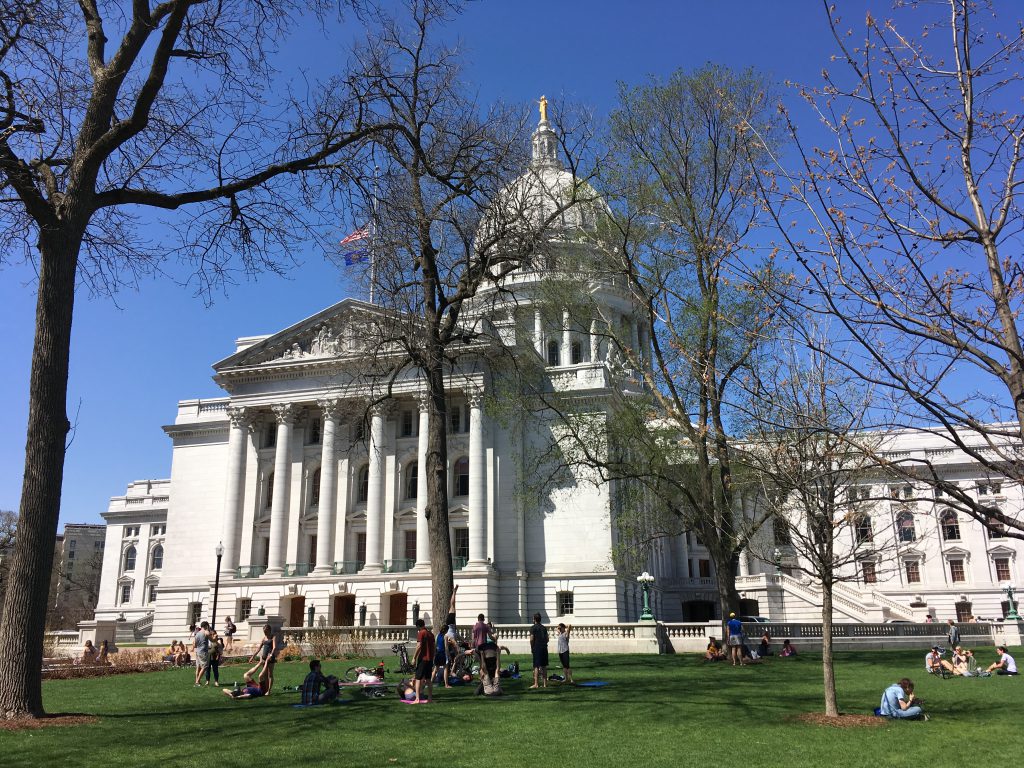Why Those Proposed Amendments to State Constitution?
Why did Republicans craft them? And why did choose August election for the vote?
Ballots in the upcoming August election will contain two referendum questions. If a majority of voters say yes, they will become part of the Wisconsin Constitution. Both measures are part of Republican Legislature’s efforts to reduce the governor’s powers. Both are part of the Legislature’s undeclared war to seize powers from the governor, a war that started when Democrat Tony Evers defeated Republican Scott Walker in the 2018 election.
To appear on the ballot, both questions were passed by two sessions of the GOP-dominated Legislature.
Of the two, Question 2 is the easier to interpret. It is entitled: “Allocation of federal moneys.” If passed it would add a new section 35 (2) to article IV of the constitution: “the governor may not allocate any federal moneys the governor accepts on behalf of the state without the approval of the legislature by joint resolution or as provided by legislative rule?”
Under current Wisconsin law, funds received from the federal government are allocated by the governor. The measure would give the Legislature veto power over the governor’s allocation, if nothing else delaying the availability of the federal funds before any use is permitted.
Often these funds are a response to some emergency, such as the COVID-19 pandemic, an economic crisis, or a natural disaster. In such a situation, speed is likely to be an important consideration. Thus, one criticism of the proposal is that by inserting the Legislature, or a committee of the Legislature, into the allocation of funds, the response to the emergency will be slowed to the disadvantage of those in urgent need.
Just how much that process could be slowed down was suggested by an earlier Data Wonk article: it described Evers v. Marklein, the case in which the Wisconsin Supreme Court shot down the requirement that environmental grants proposed by the Department of Natural Resources under the Knowles-Nelson Stewardship Program could be vetoed by the Legislature’s Joint Committee on Finance after being put on hold in some cases stretching to several years.
Accompanying his brief, Evers included a table of 27 environmental projects that had been put on hold and subsequently rejected by the committee thus far in his term. Two of these were in Southeastern Wisconsin.
One was a grant to the Ozaukee Washington Land Trust to help purchase the Clay Bluffs – Cedar Gorge site on Lake Michigan south of Port Washington and north of the Lion’s Den nature preserve. According to the chart, the committee took 430 days to decide to reject the proposal. While the committee never told the reason for the delay and subsequent rejection or who asked for the delay, scuttlebutt is that it was done at the behest of a developer who hoped to build luxury housing on the site.
The other local proposal on the list was to upgrade Milwaukee’s Modrzejewski Playfield. That proposal wins the prize for the longest submission to disposition time, a total of 903 days or about two-and-a-half years.
In both cases the governor was able to tap into federal funds. If Referendum Question 2 had been in effect at the time, supporters of the two projects would likely be out of luck. Because of the current heavily gerrymandered legislative districts, the governor’s decision is likely to better reflect the will of the whole state.
Now let’s consider Question 1, which is entitled: “Delegation of appropriation power.” It would amend the Constitution by adding a new section 35 (1) to article IV that says: “The legislature may not delegate its sole power to determine how moneys shall be appropriated.”
In contrast to Question 2, whose aim is clearly partisan–to shift power from the Democratic governor to the Republican Legislature, the aim of Question 1 is unclear. Supporters of it, such as the conservative MacIver Institute, seem unwilling to say what they expect the practical effect would be.
Certainly, its supporters believe it would help move power from the governor to the Legislature. To the extent that that happens, it would seem to run afoul of the separation of powers principle, reflecting the founders’ belief that “the accumulation of all powers, legislative, executive, and judiciary, in the same hands, whether of one, a few, or many, and whether hereditary, self-appointed, or elective, may justly be pronounced the very definition of tyranny” in the words of James Madison.
As the governor’s brief in Evers v. Marklein argues, “Through statutes that allow legislative committees to veto executive branch decision-making, small groups of legislators exercise executive authority over large swaths of government activity. The powers to create and to execute the law need to be separated again.”
One test of whether proposed legislation is good legislation is whether its supporters would still support it if the roles were reversed. Would the Supporters of Question 1 and 2 still support those questions if Wisconsin’s governor was a Republican and its Legislature Democratic? That seems unlikely.
Supporters of the constitutional amendments include the MacIver Institute, Wisconsin Manufacturers and Commerce and the Badger Institute. Among the opponents are the League of Women Voters of Wisconsin, Wisconsin Conservation Voters, the Democratic Party of Wisconsin and the Wisconsin Democracy Campaign.
It should be noted that the referendum items are scheduled for the August election that is expected to have very low turnout. This is not a random choice but the result of gaming the system by the amendments’ authors. Originally the bill was scheduled to take place on the spring 2023 ballot. But interest in that election surged because of the race for Supreme Court justice between Daniel Kelly and Janet Protasiewicz. The supporters of the amendments then slowed action, pushing the referendum into the August partisan election.
Turnout in August is shaping up to be very low. Most of the August races have only one candidate. Thus, the switch to August reflects the belief that low turnout favors Republicans.
It should be noted that supporters of the proposals have been open about why they are offered as amendments to the Constitution rather than bills for legislation: Constitutional amendments cannot be vetoed by the governor.
The American concept of the Constitution is that the document contains immutable principles that are intended to withstand the test of time. In contrast, the Russian version of a constitution is that it is a platform for political action. Republicans in the Legislature seem to be leaning toward the Russian model.
If you think stories like this are important, become a member of Urban Milwaukee and help support real, independent journalism. Plus you get some cool added benefits.
Data Wonk
-
Life Expectancy in Wisconsin vs. Other States
 Dec 10th, 2025 by Bruce Thompson
Dec 10th, 2025 by Bruce Thompson
-
How Republicans Opened the Door To Redistricting
 Nov 26th, 2025 by Bruce Thompson
Nov 26th, 2025 by Bruce Thompson
-
The Connection Between Life Expectancy, Poverty and Partisanship
 Nov 21st, 2025 by Bruce Thompson
Nov 21st, 2025 by Bruce Thompson






















All I needed to know about these questions was that the current Republican controlled legislature wrote them and got them on the ballot. My vote will be a resounding NO on both questions.
NO! on both!
Most people will have difficulty understanding the two referendums because of the wording. If your neighbors respect your opinions, a yard sign is a good idea.
Great idea for a yard sign, but where can we find a sign that displays “NO” for Both Wisconsin Constitutional Amendments?
VOTE NO
🚫
AMENDMENTS
I made a sign recycling a former election sign; turned inside out. Get your markers out.